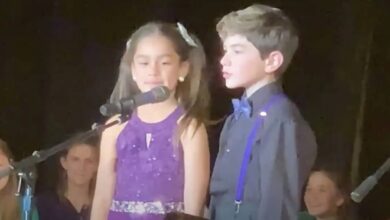Melodies of Tradition and Transition in All in the Family
The opening and closing themes for All in the Family (1971-1979), particularly “Those Were the Days,” are iconic in American television history. Sung by Carroll O’Connor (Archie Bunker) and Jean Stapleton (Edith Bunker), the song encapsulates Archie’s nostalgic yearning for the simpler times of his youth. Its vaudeville-inspired melody and politically charged lyrics reflect the show’s balance between humor and social commentary. The tune opens with a reference to Glenn Miller, a big band leader from the 1940s, immediately invoking a time of supposed stability and traditional values, much like what Archie longs for.
The lyrics touch on themes like gender roles, economic change, and political leadership, subtly revealing Archie’s desire to return to a pre-welfare state America. The line, “Mister, we could use a man like Herbert Hoover again,” refers to Hoover, president during the Great Depression, symbolizing a return to perceived self-sufficiency. The cultural tension between tradition and progress was central to All in the Family, and this song set the tone for the kinds of debates that played out on the show.
The song’s playful, almost off-key performance by O’Connor and Stapleton further emphasized the charm of the working-class Bunker household. Their imperfect singing highlighted their humanity and added a layer of authenticity to the sitcom’s portrayal of an American family grappling with the rapidly changing world of the 1970s. This authenticity resonated deeply with audiences who saw their own experiences and struggles reflected in the Bunkers’ lives.
Interestingly, the closing theme, “Remembering You,” was an instrumental piece composed by Roger Kellaway. While it was not as well-known as the opening song, it still contributed to the show’s nostalgic tone. The instrumental version played during the end credits, providing a subtle contrast to the lively debates and conflicts in each episode. This musical choice underscored the show’s ability to balance humor with moments of reflection and sentimentality.
The integration of these themes into the show’s music was a deliberate choice that reinforced the narrative’s exploration of generational divides and societal changes. The opening song’s references to past decades served as a musical reminder of the Bunkers’ struggle to adapt to new social norms and economic realities. This musical backdrop helped to frame the characters’ interactions and the show’s commentary on contemporary issues.
The song’s themes, both in the opening and closing credits, resonated with audiences, reflecting the generational divides and social upheaval of the time. While many embraced Archie’s traditionalism, others saw the humor in his inability to adapt to new realities. This was mirrored in the overwhelming success of the show, which became one of the highest-rated series on television, dominating the Nielsen ratings from 1971 to 1976. The widespread appeal of the theme songs contributed to the show’s ability to engage viewers across different demographics.
“Those Were the Days” wasn’t just a catchy tune; it became emblematic of the era’s tensions and set the stage for how television could address complex societal issues through comedy. The song became so famous that viewers frequently asked about the lyrics, especially the line, “Gee, our old LaSalle ran great,” which referred to a luxury car brand from the early 20th century. This line, among others, highlighted the show’s attention to detail and its ability to weave historical references into its narrative fabric.
Carroll O’Connor and Jean Stapleton’s performances of the theme song added a unique dynamic to the show. O’Connor, known for his portrayal of Archie Bunker, brought a gruff authenticity to the song, while Stapleton’s Edith provided a softer, more melodic counterbalance. Their vocal interplay mirrored the often-contentious yet loving relationship depicted on screen, enhancing the show’s emotional depth. This harmonious yet imperfect duet became a signature element of All in the Family.
Beyond the show’s immediate success, the theme song’s legacy can be seen in its influence on subsequent television series. By effectively using music to convey character traits and thematic elements, All in the Family set a precedent for future sitcoms. Shows like The Cosby Show and Roseanne followed in its footsteps, using theme songs to establish the tone and context of their narratives. The ability of “Those Were the Days” to encapsulate the essence of the show demonstrated the power of music as a storytelling tool in television.
Jean Stapleton’s contributions extended beyond her role as Edith Bunker. Her involvement in the theme song showcased her versatility as a performer and her commitment to bringing authenticity to her character. Stapleton’s background in theater and her experience with musical performances enriched her portrayal of Edith, making the theme song an integral part of the show’s identity. Her collaboration with O’Connor on the theme song exemplified the strong on-screen chemistry that was pivotal to the show’s success.
The enduring popularity of All in the Family and its theme songs speaks to their timeless relevance. Decades after the show concluded, “Those Were the Days” remains a nostalgic reminder of a pivotal era in American history. The song’s ability to evoke a sense of longing and reflection continues to resonate with audiences, highlighting the show’s lasting impact on television and culture. The harmonious blend of humor, social critique, and musical storytelling ensures that All in the Family remains a landmark in the evolution of American sitcoms.





